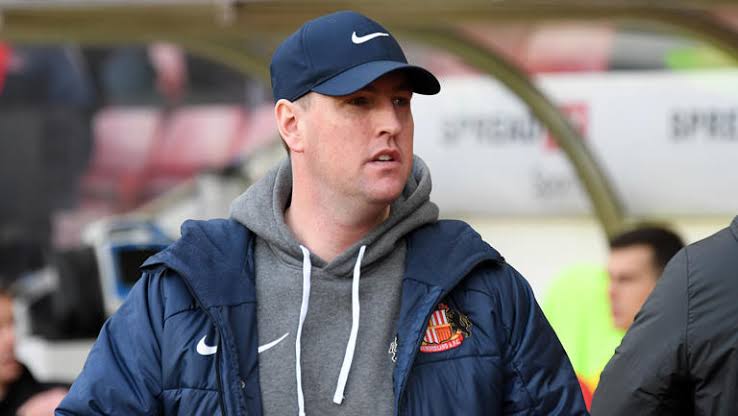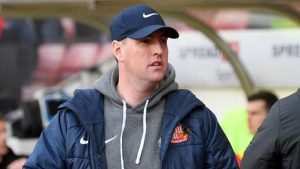

It will be 100 days next week since Michael Beale was ousted, and Sunderland still hasn’t chosen a successor. Sunderland fans continue to wait. Saturday will mark three weeks since the end of what proved to be a painfully disappointing Championship season, but no hands have been raised, and no accountability has been established. Perhaps most importantly, there is no clear path forward, no line drawn in the sand, and nothing to give supporters hope that things will be different when they return from the summer.
The retained list has been released, but there have been no remarks from the sporting director or any other top club officials. The club’s new Chief Business Officer has freely discussed his vision for the future and crucial initiatives, but there has been no mention of football.
Perhaps more remarkably, it has been more than three months since Michael Beale was fired and Mike Dodds was appointed interim manager. Kristjaan Speakman stated in a club statement: “We will keep our supporters updated as significant developments occur.” It was 95 days ago. Nothing has happened since then. Results sank, the season dragged on, and the front-foot playing style disappeared. Sunderland appeared rudderless on the pitch, and it was impossible not to conclude that this was due in large part to their lack of direction away from it. Fans have not heard directly from chairman Kyril Louis-Dreyfus since his social media apology for the Black Cats Bar debacle in January.
There was an awareness, if not acceptance, that this was done in part to give the team the time and space it needed to prepare for a summer reconstruction. In the only contact since Beale’s departure as the club’s sporting director, Speakman told the supporter collective at a structured dialogue meeting that the club had sought time to think on what had gone wrong, both during Beale’s employment and following. That time had been set aside to conduct a thorough recruitment procedure, which should boost the likelihood of a successful conclusion.
Even if the last weeks of the season were a terrible chore, fans endured it in the hopes of a quick start to the summer rebuild. That has not happened, and it is beginning to feel like a leadership failure, whether that is a fair assessment.
So, how far has the hunt for a head coach progressed? The conditions that led Sunderland to reject a permanent appointment in February remain substantially unchanged. Sunderland believed that a stronger and broader pool of prospects would be available in the summer, having been frustrated by their attempts to sign favored individuals in the middle of the season when Tony Mowbray was fired. With several domestic divisions only wrapping up and the management merry-go-round just getting started, it’s not a stretch to assume that the club has been waiting for the critical pieces of a larger jigsaw to fit together.
The hierarchy believes that patience is essential to find the ideal candidate, and it is apparent that several figures in the frame are not yet public. However, the pool will soon begin to diminish again. Danny Rohl has agreed to a new contract with Sheffield Wednesday, and while it’s unclear how much of a frontrunner Will Still has been this time around (he wasn’t when the process started, but then left Stade de Reims and became a free agent), he, too, appears to be moving forward with potential opportunities elsewhere.
At this moment in late May, we have most likely not reached the point when the stasis has an impact on next season’s preparations, which is certainly one of the reasons Sunderland has been content to wait. That will change as athletes consider their next steps and the recruitment process gets underway next month.
However, this stillness and purgatory pose a bigger risk. The first and most obvious disadvantage is that it puts the new head coach in a difficult position from the start. Perhaps an appointment will be made that is immediately understandable, demonstrates a clear approach, and explains why Sunderland has had to wait. What if it doesn’t? The longer the delays last, the greater the stakes get in landing a favored candidate, and the consequences of failing to do so become more serious.
The second consequence is that it further erodes confidence between the team and its fans. Supporters were persuaded that Mowbray’s departure will allow them take the next stage in developing a high-performance culture. What has been the most effective response to what has occurred since then? There was little sign of sensible succession planning or decision making in the process that culminated with Beale’s hiring, or in a January timeframe that passed without the team’s fundamental issues being addressed. The campaign’s winning squad was a pale imitation of the regime’s ‘bold, inventive, and hardworking’ credo.
The club’s journey from the depths of League One to a Championship semi-final instilled trust in the process, and the fact that it’s a club that generally keeps its cards close to its chest is obviously a good thing. However, that trust has been destroyed by a series of terrible judgments, and there is currently no indication that any of them are being remedied.

Leave a Reply